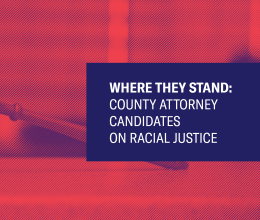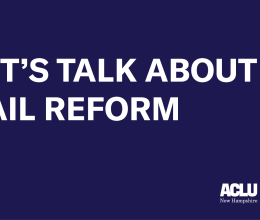
The U.S. Constitution prohibits courts from jailing people for being too poor to pay their legal fines. This may be happening in New Hampshire anyway. This practice, which would effectively create debtors’ prisons in this state, is both unconstitutional and wrong.
For example, on March 4, 2014, a 22-year-old poor, single mother of two infants was ordered to jail if she did not pay by the end of the day an outstanding $420 fine resulting from a violation-level conviction—a conviction which does not permit a jail sentence. The Circuit Court did not conduct a hearing on the woman’s ability to pay the fine. Because the woman couldn’t pay this fine, she was jailed that afternoon. She didn’t have the means to pay the fine, in part, because her apartment was rendered uninhabitable by a fire in January 2014, and she had spent the last two months trying to rebuild her life after this disaster. With one day in jail equating to each $50 of the remaining $420 fine, she was slated to be in jail for 9 days.
The next day—after the woman had spent one night in jail—the NHCLU filed with the Superior Court an emergency petition for a writ of habeas corpus seeking the woman’s immediate release. As explained in the petition, “[t]he Circuit Court’s order is unconstitutional and must be immediately vacated because Defendant is financially unable to pay this $420 amount, as she is indigent and is therefore not wilfully failing to pay this fine.” In an important victory, the Superior Court issued a decision immediately granting the NHCLU’s petition and ordering that the woman “be released on an immediate basis.”
In another case from February 2014 documented here, a Circuit Court judge ordered that a poor person be jailed if he didn’t pay $212 in less than 48 hours. As the Court made clear, if the remaining $212 was not paid by that time “for any reason, he shall be, immediately, transported to the HCHOC [Hillsborough County House of Correction] to be held until the amount is paid in full.” The NHCLU secured an immediate decision from the New Hampshire Supreme Court delaying this order.
Being poor is not a crime in this country. Incarcerating people who cannot afford to pay fines is not only cruel, but it takes a tremendous toll on precisely those families already struggling the most.
The law requires that courts hold hearings to determine defendants’ financial status before jailing them for failure to pay fines and fees, and defendants must be provided with lawyers for these hearings. If a defendant cannot pay, the court must explore options other than jail. U.S. Supreme Court precedent makes clear that local courts and jails should not function as debtors’ prisons. Beyond the questions of legality, debtors’ prison practices make no financial sense since courts routinely spend more to jail defendants than they would recover in fines.
The NHCLU will continue to monitor whether Circuit Courts in New Hampshire are engaging in this unconstitutional practice.

